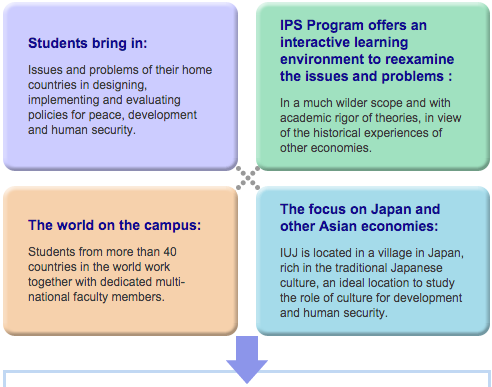The Curriculum
MA in International Peace Studies (IPS)
Most of the courses offered in the first year are required, the second year courses are electives. Students may select their courses under the guidance of their supervisor.
The Program has been structured around two fundamental and highly important themes in peace studies. One is the issue of global peace and war and how to avert conflict and manage violence. Courses such as International Peace and Security, International Conflict Resolution and Environment and Human Security, Human Rights and Global Justice and Global Civil Society are intended to give students a necessary background to these global issues. The second theme is the very contentious and complex relationship between development and peace which is examined in depth in the various courses in the program. Such courses include International Politicas Economy, International Migration, and Povety and Human Security.
Elective courses of the Program in the second year draw on a variety of courses offered by Graduate School of International Relations and business management courses offered by Graduate School of International Management, in addition to the courses related to global policy issues.
To write a Master’s Thesis and defend it are the most demanding component of the Program. It gives each student an opportunity to analyze his/her own problem in depth by integrating all the skills and knowledge he/she has acquired in the Program.
for individuals who wish to contribute to creating the conditions for peace, enhancing the security of individuals, and eliminating poverty and other institutional impediments for human development in the world.
1st year, SUMMER Summer Intensive English courses
Program students with weak English background [TOEFL score below 600 or its equivalents] will be required to take Intensive English Program offered at IUJ during the summer before the regular school year starts. Students with stronger English background are exempted from this requirement.
Mid-September, 10 days before the entrance ceremony
A short Japanese language course for new students is provided before the start of the academic year in the middle September. Qualification tests will be provided at the end of the course to determine whether the Program students can continue to learn Japanese and at which level if they can.
In addition all the students will be required to take an Exemption Test of English at the beginning of the first year. Depending on the levels of their English, they will be required to take a certain number of English courses. Because of the time constraint, it is generally difficult for those who are not exempted from English courses to take Japanese language courses. Those who wish to learn Japanese in the IUJ Japanese Language Program must be proficient in English, at least TOEFL 550 or its equivalent.
An example of courses for completing the requirement
(The courses written in bold letters are required core courses. For non-required courses, it is possible to choose from a large number of courses available both in GSIR and GSIM. The following is just one example.)
| Year | Term | Course |
| 1st year |
FALL | International Politics Poverty, War and Human Security Human Rights and Global Justice International Migration Theory Essentials of Economics Japanese |
| WINTER | International Political Economy Environment and Human Security Global Civil Society International Migration Policy Japanese |
|
| SPRING | International Conflict Resolution ASEAN Governance and Development Peace, War and Development of Modern Japan Public International Law Advanced Seminar I (preparation of Master’s Thesis) Japanese |
|
| 2nd year |
SUMMER | Field study and preparation of Master’s Thesis; internships |
| FALL | Organizational Behavior* Project Cycle Management Advanced Seminar II Japanese |
|
| Winter | Environmental Economics Cross-cultural Management* Global Strategy and Organization* Advanced Seminar III Japanese |
|
| Spring | IT Strategy and Policy Planning* UN and Global Governance International Humanitarian Law Japanese Submission of a Master’s Thesis and final oral exam |
Course marked* are GSIM courses.
What can Program students expect to accomplish in the IPS Program for International Development?
Building capabilities of students:
- to identify problems and issues of their home countries in reference to those of other nations and the world,
- to analyze the problems systematically in appropriate theoretical frameworks and in view of the experience of other nations and the world,
- to design alternative policies for peace, development and human security under various political, social and economic conditions,
- to implement policies effectively in a challenging political, social and economic environment,
- to evaluate policy outcomes in a coherent theoretical framework, and
- to work and cooperate effectively with various international organizations and other nations for enhancing peace, development and human security of their home countries and the world.


